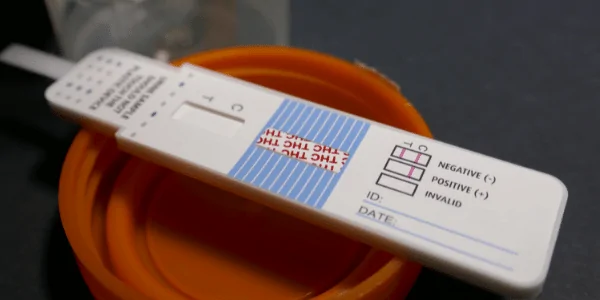Toke or Broke? Keeping a Job With a Medical Card


How many people do you think tell their employer or fellow employees that they got a medical card? Despite the fact that clinical and social understanding of cannabis has improved over the past ten years, acceptance has been slow. Your job or your health? Choose one.
After decades of propagandizing cannabis as an “evil and addictive drug,” the hardest battle fought by patients, advocates, and policymakers these days is changing that perception. Cannabis now has a place in healthcare as it has become more recognized as an alternative medicine that is safer than opioids and NSAIDs.
However, people who have a medical card, in many cases, are afraid to let their employer know–and for a good reason. If the employer has a randomized drug testing policy, that honesty about after-hours use could cost the patient their job even if they never appear for work impaired by marijuana.
If you have a medical card and are currently looking for a new job, you have a new priority: to find an employer who does not do random drug testing. This would allow you to keep your career and your after-hours use of medical cannabis. You could also find an employer that does drug tests but exempts employees who have a medical card.
Can your employer fire you for testing positive for THC? How can you keep a job if most employers require drug testing as a condition of hiring? These are just some of the complications that patients using medical marijuana face.


Has State Cannabis Legalization Increased the Rate of Employer Testing?
If you have been looking for a new job recently, you may have noticed a few changes in how companies list employment opportunities. Front and center, you are likely to see a disclosure about random employee drug testing. It might be at the bottom of the job advertisement, but it’s often there.
What is interesting is that employer drug testing seems to be increasing, not decreasing. Now that 38 states have legalized medical cannabis, are employers starting to drug test more, even for occupations that may not present a safety or liability risk for the employer?
In the not-so-distant future, it could be possible to ask LinkedIn and popular job search websites like Indeed or Monster to display jobs that do not require employee drug testing. For some businesses, that might help with recruitment if potential hires knew that their use of medical marijuana after hours would not get them fired.
As more states legalize medical or adult-use (recreational) marijuana, they are also forced to look at current labor laws. Should someone with a medical card be protected from getting fired if they only use cannabis after work hours? Many states, such as California, are providing legislation that protects medical cardholders.
Is It Fair to Drug Test Employees Who Have a Medical Card?
Determining whether an employer should drug test medical cardholders is a complex question. Employees who have certain types of jobs that cannabis can impact may be a safety risk to themselves, the public, and the employer that they work for.
For example, people who have a CDL (commercial driver’s license) operate passenger or cargo-carrying vehicles like large trucks and buses. When they are involved in an accident, the collateral damage is high, and so is the potential for fatalities and injuries. That is why transportation companies are subject to the “Clearinghouse,” an annual test for drug use among CDLs.
But what about someone who works at a desk all day? Should they be allowed to dose medical cannabis before they go to work? Another concern is impaired driving. It may be okay for an employee to have a low dose of THC, but driving while impaired? That is also a public safety risk.
Someone who has been a long-time user of cannabis may not be as susceptible to impairment. However, if someone has just received their medical card and started using cannabis for the first time, it could be different. They could have a level of THC impairment that puts them (and those around them) at risk for injury.
With more states legalizing medical cannabis, it places patients in a predicament. They are not breaking the law by using medical marijuana, but they could lose their job if they test positive for THC.
Testing Positive for Evening and Weekend Cannabis Use
The consequences for driving or showing up to work impaired are enough of a deterrent for most people. However, when the conversation about drug testing at work starts, it is important to differentiate where and when employees are using medical marijuana.
For most people, medical cannabis is something they use after work and on weekends. There are other methods of managing symptoms with prescription medications. People with chronic health conditions are likely to use those methods during the workday—both for legal and practical reasons.


The workplace is not likely to be the kind of environment where you want to be high, and most employers do not want employees onsite and intoxicated. We have to consider that for most responsible employees, which would not be an issue.
The question then becomes whether people have the right to use cannabis medicinally at home during their off-hours. After all, employees are not randomly tested for alcohol in the workplace. People who consume alcohol after work would have a consistent level of ethanol in their bodies, but they are not drinking at work or during the workday (in most cases).
Cannabis should be viewed the same as after-hours consumption of any other legalized substance. To allow a patient with a medical card to jeopardize their job for legally using cannabis after hours? That doesn’t make sense. It speaks to an outdated, unfair, but persistent stigma about medical marijuana.
Does Your Job Have a Lower Rate of Employee Drug Testing?
If you are looking for a new job, it might be better to search in fields with a lower-than-average rate of drug testing. Some employers do not require a drug test as a condition of being hired or submit employees to randomized testing.
According to data from Zippia, an employment and career search firm, the following jobs have a lower employee drug-testing rate. On average, employees in the following sectors are tested at 1% to 4% annually.
- Culinary and food preparation
- Film production or entertainment
- Managerial jobs
- Real estate agents
- Creative jobs (writing, graphic design, etc.)
- Web and IT developers
Jobs with a higher-than-average rate of drug testing include healthcare, law enforcement, legal work, construction, and transportation roles. Any job that requires the operation of heavy equipment, such as a crane, forklift, or heavy truck, usually has employer drug testing requirements. In some cases (like the trucking industry), federal regulations may also require nonemployer testing to maintain a certification or license.


States Creating Better Job Protection Laws for Patients With a Medical Card
Some states that have legalized medical or adult-use cannabis have also realized this is a problem, and they understand that patients with a medical card can be put in a difficult position where they have to choose to live with symptoms that make daily life painful or risk losing their job with a randomized drug test.
At the time of writing, 24 states have created protections for employees with medical marijuana cards. Some of the states have created specific legislation to outline employment protections, while others have seen court decisions in favor of the employee that set new legal precedents.
States and territories that have put employee protections in place for medical cardholders include:
- Arizona
- Arkansas
- California
- Connecticut
- Delaware
- District of Columbia
- Illinois
- Maine
- Maryland
- Minnesota
- Missouri
- Massachusetts
- Montana
- Nevada
- New Jersey
- New Mexico
- New York
- Oklahoma
- Pennsylvania
- Puerto Rico
- Rhode Island
- South Dakota
- Virginia
- Utah
- Washington
- West Virginia
If an employee has a medical card that has not expired and provides it to the employer before drug testing, that may be a better approach. However, many employees are afraid of losing their jobs if they admit to their boss that they use medical marijuana.
Employers do need to know that they can be sued if the employee has not been involved in any safety infractions or performance problems and the sole reason for firing the person was medical cannabis.
Does the ADA Protect Patients With a Medical Card?
Technically, patients should be protected under the Americans With Disabilities Act (ADA). That prohibits employers from discriminating against an employee on the grounds of a disability. It can also include using medical cannabis to treat conditions like cancer, diabetes, epilepsy, and other chronic conditions.
Unfortunately, the courts have decided that as long as cannabis remains federally prohibited, the rule and protection of the ADA cannot be applied, even for patients who have a medical marijuana card issued by a physician and approved by a state MMJ program.
One of the things that would change if the MORE Act passes through Congress? The Americans With Disabilities Act (ADA) will apply, and all barriers to patient protection under the ADA will be removed.
That doesn’t mean that it would be illegal for employers to request drug testing either as a term of hiring or randomized for all employees. But what it does mean is that firing or applying other punitive measures against a patient with a medical card would be illegal. Employees could seek court action against the employer for discrimination.
If cannabis is federally legalized, it will result in an amendment to the Americans With Disabilities Act. That would likely create a subsection in the laws to address medical cannabis and differentiate employees protected for after-hours use versus employees found impaired by cannabis during the workday.



